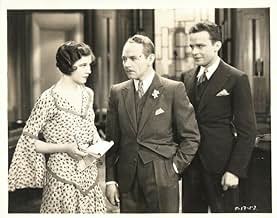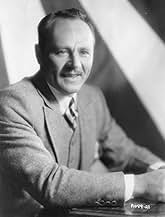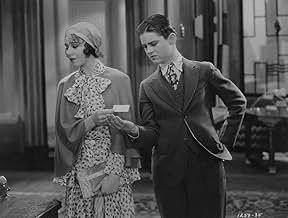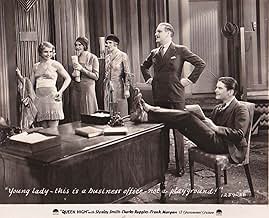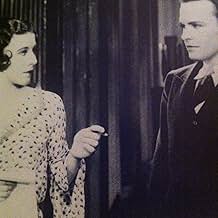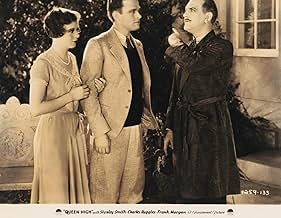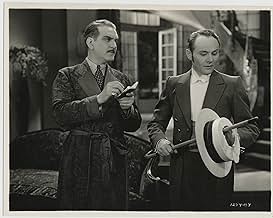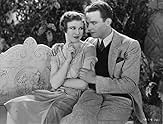The two partners of a ladies' garter business are constantly feuding with each other. When they ask their lawyer to dissolve their partnership, he proposes that instead the two of them play ... Read allThe two partners of a ladies' garter business are constantly feuding with each other. When they ask their lawyer to dissolve their partnership, he proposes that instead the two of them play a single poker hand: the loser to become the winner's personal manservant for a year.The two partners of a ladies' garter business are constantly feuding with each other. When they ask their lawyer to dissolve their partnership, he proposes that instead the two of them play a single poker hand: the loser to become the winner's personal manservant for a year.
- Mrs. Rockwell
- (as Theresa M. Conover)
- Cyrus Vanderholt
- (as Rudy Cameron)
- Party Guest
- (uncredited)
- …
- Dancer
- (uncredited)
Featured reviews
Frank Morgan and Charles Ruggles play the feuding captains of industry and play off of one another like a high-class version of Edmund Lowe and Victor McLaglen in their buddy movies. Paramount always cast Ruggles as the drunk in his early films, but here they let him play it sober and it suits him. The fact that the business is a garter manufacturer gives an excuse for lots of scantily clad young ladies to wander in and out of scenes modeling the concern's latest products.
Complicating matters for the feuding business partners is that Ruggles' character's nephew (Stanley Smith) and Morgan's character's niece (Ginger Rogers) have fallen in love. They mainly handle the musical scenes which are quite charming. Ginger Rogers was still going through her flapper persona phase in 1930 and her singing is pretty good and adds to the fun.
The plot resolution is rather abrupt and not very satisfying, but the journey getting there is lots of fun. Highly recommended.
Also, this should be labeled one of the earliest screwball comedies. Ruggels and Morgan are great in their roles, and a VERY young Ginger Rogers is great as a cute flapper. You can also catch Elanor Powell dancing in one scene very briefly.
It is a shame that this movie is not widely available, as I enjoyed it more than most musicals of the 1929-1930 cycle.
There is a mini love story played out by Ginger Rogers (Polly) and Stanley Smith (Dick) as the relations of both the feuding bosses but it really takes second stage to the bickering of the 2 male leads. And they are very funny and constantly at each other's throats. The dialogue is amusing and we get a couple of songs as well as an entertaining song and dance section started off by Ginger Rogers and ending with Eleanor Powell briefly tap dancing on a table. You won't realize it is her so watch out. It's fascinating if you are interested in this kind of stuff.
An amusing film that is acted very well by the two main leads and definitely worth another watch. Unfortunately, the sound isn't always as crisp as would be preferred and although it is a fairly short film, I found that it seemed longer. This is usually a bad sign that a film is boring but that's not what I felt whilst watching this effort. Highly enjoyable.
The actual lead roles are performed by Charles Ruggles (reprising his part from the 1926 musical) and Frank Morgan as equal partners in a firm that makes only one product: ladies' garters. (What we Brits would call "suspenders".) This premise offers huge potential for musical numbers (I kept expecting "Garter sing, garter dance!") but is ultimately wasted. Ruggles went through most of his film career with an annoying little moustache; midway through 'Queen High', he trades it for some annoying sideburns. For once, Ruggles isn't typecast as a meek husband; here, he earnestly courts Betty Garde and shows some backbone. He's also pursued by Nina Olivette, who's quite pretty but she's lumbered with a hideous hairstyle and even worse dialogue ... which is written in some horribly phony bad grammar that's vaguely prole American and vaguely prole British but really from Movie Cliché-Land. In one scene Ruggles cries her 'Australian', but she's definitely no Ozzie sheila, too right. (Another IMDb reviewer is mistaken; it's Olivette, not Garde, who plays the 'harassed maid'.)
The two best songs here were written for the movie, both with lyrics by Yip Harburg: "Brother, Just Laugh It Off" (tune by Ralph Rainger) and "I Love the Girls in My Own Peculiar Way" (Henry Souvaine). The latter is a bizarre ditty in which Ruggles claims to be a serial killer of women. He's not much of a singer; he gets one of Yip Harburg's trademark wordplays -- "When you get pneumonia, I'll 'phone ya" -- but Ruggles clearly enunciates "phone YOU", queering the rhyme. He also mistreats a black laundress.
In the opening shot, William Steiner's camera trundles forward lugubriously, twiddles its casters awhile, then trundles back again. The rest of the camera-work is merely adequate, except for one impressive set-up with Ruggles in a doorway. There's an attempt to give Stanley Smith an "entrance" by staging his first scene with his head hidden, gradually revealing his face. William Saulter's set designs throughout are excellent, especially a very convincing sequence on a New York subway platform and aboard the rush-hour train. Frank Morgan's tycoon character and his wife have a huge mansion, with twin beds about twelve feet apart.
Modern viewers get the usual old-movie reminders that money's not what it used to be: in 'Queen High', Mrs Rockwell has an annual income of $6,000 yet serves her guests caviare.
Most of the dialogue (from the original play) is quite witty, though we get a few clunkers. An orchestra musician plays "second bass", so we know this is the set-up for a baseball joke. Still, any movie that ends with a lawyer getting chucked into a pond can't be all bad.
There's an acetate print of "Queen High" in the Library of Congress, duped from a bad nitrate print; the soundtrack pops, and many scenes are dark. In one dialogue sequence, Smith calls himself "red-headed", yet throughout the movie (this LoC print, at least) his hair looks jet-black. "Queen High" really isn't good enough to rank high on the list of films wanting restoration. This movie was released while Lon Chaney was on his deathbed, but I'll bet he wasn't dying to see it. The original 1914 play was titled 'A Pair of Sixes': I'll add one more six and rate this movie 6 out of 10.
Did you know
- TriviaMembers of the cast of the successful Broadway Show "Follow Thru" can be seen in some scenes, among them is Eleanor Powell.
- Quotes
Polly Rockwell: Hello, Mr Johns.
T. Boggs Johns: Hello.
Polly Rockwell: You're awfully unhappy, aren't you?
T. Boggs Johns: Yes... .no. Why should I tell you?
Polly Rockwell: Well, because I want to help you.
T. Boggs Johns: Huh, huh, you're a Nettleton. Why should you want to help me?
Polly Rockwell: I love Dick.
T. Boggs Johns: You love Dick? What does that make me, a Moose?
Polly Rockwell: Why don't you brace up and be man?
T. Boggs Johns: No, I can't. My vest is too tight.
- SoundtracksEverything Will Happen for the Best
Written by Buddy G. DeSylva and Lewis E. Gensler
Details
- Runtime1 hour 25 minutes
- Color
Contribute to this page


